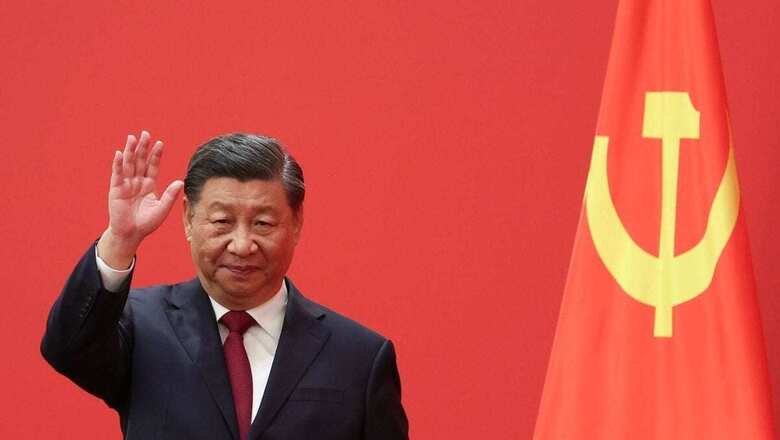
views
Xi Jinping’s China has begun to increasingly use exit bans (not allowing people to leave the country) against human rights defenders (HRD), journalists, and other individuals that threaten or have upset the Chinese Communist Party (CCP), according to a new report.
China can use exit bans against any individual without any just cause or transparency, it says.
These decisions can be taken by local bodies and can also not be appealed. Exit bans are the latest tool being used by China and the CCP to bring its increasingly freedom-oriented population back under its control and exert its autocratic might, the report says.
In the context of China, an exit ban is a measure taken that requires a citizen to not leave the country for a certain period of time due to various reasons like safeguarding national security and interests, smooth conduct of civil matters, and maintaining civil public order.
Further research into exit bans will reveal that the law governing it is exceedingly vague and ambiguous and its open-ended wording gives it almost infinite reach, says the report.
This expansive measure allows the Chinese government to use exit bans as a tool of control, punishment, and repression against those that it believes to be involved in actions that are detrimental to China or the CCP, it says.
Some examples of the individuals that China uses these exit bans against are journalists, human rights defenders, activists, and lawyers. These exit bans are used to pressure and coerce these individuals into behaving how the party wants them to act and discourage them from speaking against the tyrannical actions of the CCP or the Chinese government, according to the findings.
What makes exit bans truly scary and utterly diabolical is the fact that they can be issued by any non-judicial entity without the need for any legal justification, the report reveals.
Exit bans also lack transparency and those that have been hit by exit bans are unable to challenge or appeal them. They are forced to be at the mercy of the Chinese government and their whims and fancies, says the report.
The Chinese government uses exit bans to punish HRDs for their rights defence work and also to prevent them from speaking out about the CCP’s abuse of human rights, it adds.
In addition, even their family members and those associated with them can be arbitrarily subjected to exit bans as a means to pressure the HRDs to give up their activism, it has been found.
One prominent and sad case is that of human rights activist Guo Feixiong who was barred from leaving China along with his wife who required cancer treatment in January 2021. Feixiong’s wife died in November 2022 and two days later he was arrested on charges of inciting subversion of state power.
As mentioned earlier, the imposition of exit bans is not only limited to Chinese citizens. The Chinese government often threatens or arbitrarily bans businesspeople, and foreign families of Chinese fugitives from exiting the country, the report maintains.
According to it, 44 foreign businesspeople have been hit with exit bans by China between 1995 and 2019. An example of this is Irish businessperson Richard O’Halloran, who was prevented from leaving China for nearly three years due to a civil business dispute.
Journalists make for prime targets for China’s exit bans. As they can easily expose the CCP’s abhorrent actions, China takes extra steps to keep them in line, says the report.
Australian journalists Bill Birtles and Michael Smith were essentially held hostage by China for several weeks when they were informed that they were hit with an exit ban because they were persons of interest in the disappearance of another Australian journalist, Cheng Lei.
Even family members are not spared as China in the last few years has purportedly detained foreign citizens in an effort to force their family members to return.
US citizens and siblings Victor and Cynthia were not allowed to leave China for three years from 2018 to 2021 in an effort to have their father return to China. On January 11, 2023, the US Department of State issued a travel advisory wherein they stated that China was arbitrarily issuing travel bans to foreign citizens and using them as hostages or bargaining chips against foreign governments.
The Chinese government, or rather the CCP also purposefully targets entire marginalised ethnic groups such as the Tibetans and the Uyghur. These bans last for decades. In China there exist two systems for the issuance of passports: one fast-track system is reserved for the Han majority, while the much slower and tedious version is for those that reside in the autonomous region (consisting mainly of ethnic minorities). This was first done to prevent travel for religious reasons, preventing Tibetan Buddhists from attending the teachings of the Dalai Lama in India, and preventing Uyghur from visiting Mecca, in Saudi Arabia, it has been found.
In the present day, China applies blanket exit bans on these communities in order to prevent them from going abroad and speaking about Chinese atrocities against the Tibetan and Uyghur communities, the report says.
According to the findings, another form of a pseudo-exit ban is the confiscation of passports of Uyghur and Tibetans by the Chinese government.
In 2012, the year that Xi Jinping rose to power, Chinese authorities began confiscating the passports of all those residing in the Tibetan Autonomous Region (over 90% being Tibetans). This was followed by a similar action wherein millions of passports were confiscated to be kept “safe” from the people of Xinjiang Uyghur Autonomous Region, according to the report.
The use of exit bans is an insidious way for the CCP and the Chinese government to punish and force their citizens and even foreign governments to bend to their will.
These exit bans have little to no legal basis. When questioned, most people are given the reason of ‘national security grounds’, the report states.
On top of that, it is difficult to even find out who or which ministry or body ordered the ban. Transparency is also a daunting issue, as many victims of the ban are not made aware of it until they arrive at the airport to discover that they have been barred from leaving China. While these exit bans are not new, China has recently added new legislation concerning exit bans making them more expansive, like the Supervision Law, Anti-organised Crime Law, and Anti-Telecom and Online Fraud Law, says the report.
Foreign governments and people visiting China must be vigilant about these exit bans as they are not exempt and can find themselves stranded for weeks if not months, it advises.
Travel to China must be undertaken only in the most extreme circumstances, the report adds.
Read all the Latest News here




















Comments
0 comment